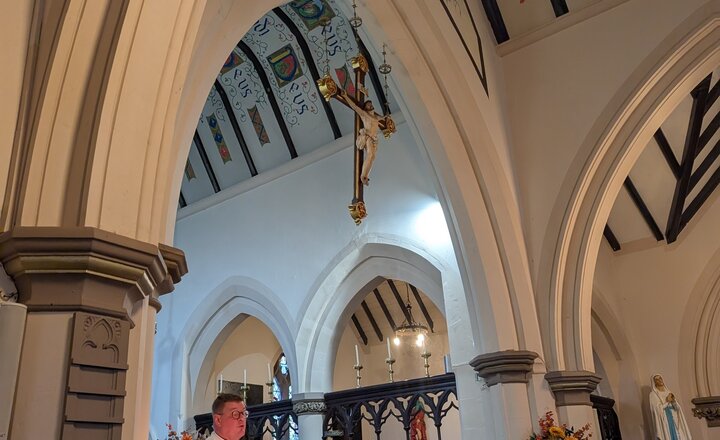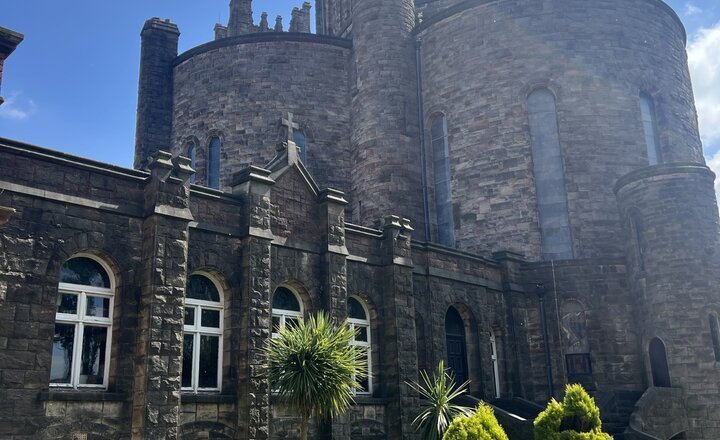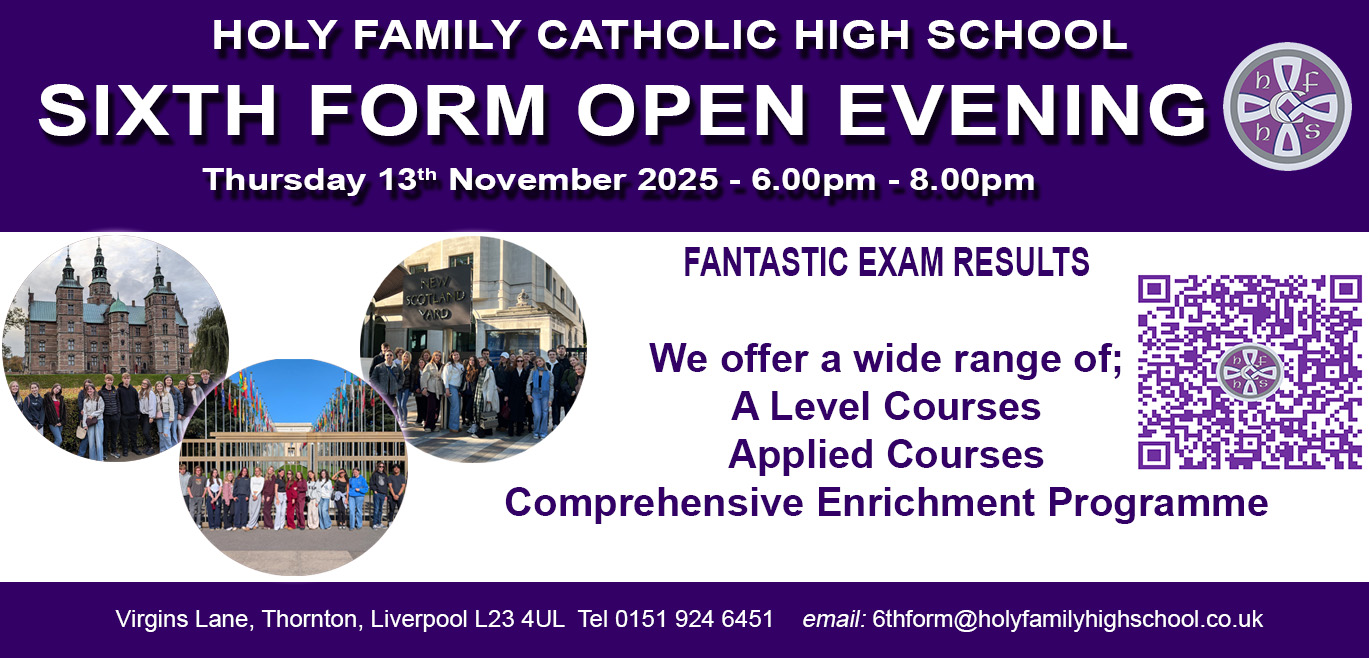Religious Education
Head of Department - Mrs C. McCarthy
At Holy Family, RE is at the core of the curriculum. In RE lessons pupils seek to understand and reflect on their own faith as well as show understanding and respect for the beliefs of others. Our intention is excellent Religious Education where young people are religiously literate and engaged, who have the knowledge, understanding and skills – appropriate to their age and capacity – to reflect spiritually, and think ethically and theologically, and who are aware of the demands of religious commitment in everyday life.
In September 2023, we introduced a new programme of study for Key Stage 3 starting with Year 7. The curriculum is structured around a central narrative of the salvation history of the Catholic Church and mapped onto the school / liturgical year:
-
Creation and Covenant
-
Prophecy and Promise
-
Galilee to Jerusalem
-
Desert to Garden
-
To the ends of the earth
-
Dialogue and Encounter
Each branch will be revisited each year in Key Stage 3, but without repetition; the curriculum is sequential and progressive.
For each branch, for each year group, we will look at the core concepts through four lenses, in the study of Catholicism:
-
Hear (Scriptural / Magisterial Text)
-
Believe (Doctrine / Theological Concepts)
-
Celebrate (Sacraments/ Liturgy / Prayer)
-
Live (Life / Ethics),
and two lenses in the study of other religions and worldviews:
-
Dialogue
-
Encounter,
As pupils progress through the school, in addition to Catholicism, they will study:
-
Other Christian denominations
-
Judaism
-
Islam
Skills Progression (Ways of Knowing)
Ways of knowing set out the skills that pupils should be developing as they progress through their curriculum journey. The three ways of knowing are:
-
Understand (name, retell, show understanding, recall)
-
Discern (recognise similarities and differences, express a point of view, explain differences, weigh up strengths and weaknesses)
-
Respond (respond personally to questions of faith, compare their beliefs and ways of life to others, critically reflect on beliefs and what they have learnt)
Summative Assessment will include all three of the above ways of knowing.
Adaptations to the curriculum:
Each topic is sub divided into four knowledge lenses:
-
Hear
-
Believe
-
Celebrate
-
Live
All learners will cover the basics of the each of the four lenses.
Enrichment
Collective Worship
Collective Worship forms an important part of the daily life of school. During form time each morning there is a daily PowerPoint to enable pupils and their form teacher to reflect and join together in prayer. Student leadership of form worship is encouraged. Each week there is a different theme which is developed as the week progresses. Themes are based on the Church year and other important events such as Remembrance and Holocaust Memorial Day. Year Group assemblies take place on a weekly basis and are led by Senior Leaders, Progress Leaders and a range of outside speakers.
Confirmation
Pupils in Year 8 are invited to register for Confirmation at Liverpool Called. You will then be invited to attend a preparation course by your local parish who will contact you directly. The Sacrament of Confirmation will be covered in depth this term in RE lessons.


Resources
https://www.aqa.org.uk/subjects/religious-studies/gcse/religious-studies-b-8063
https://www.youtube.com/user/MrMcMillanREvis
https://www.bbc.com/bitesize/subjects/zb48q6f
https://www.bbc.com/bitesize/subjects/zh3rkqt
|
Key Stage 3 Useful Websites |
Oak Academy Christianity: Unit - Oak National Academy (thenational.academy) |
|
Key Stage 4 Useful Websites |
Peace and Conflict: Unit - Oak National Academy (thenational.academy) Relationships and Families: Unit - Oak National Academy (thenational.academy) GCSEpods Judaism Beliefs and Teachings: https://members.gcsepod.com/shared/podcasts/title/12992 GSCEpods: Judaism Practices: https://members.gcsepod.com/shared/podcasts/title/12993 Seneca Learning (free online learning) Free Homework & Revision for A Level, GCSE, KS3 & KS2 (senecalearning.com) |
Careers in Religious Education
Contrary to the general misconception that the only career open to a student of Religious Studies is the priesthood, there are a large number of career pathways that are open to you.
The top careers are:
- Advertising
- Archivist (Museums and Libraries)
- Charity work
- Human Resources
- Law
- Politics / Civil Service
- Media (journalism)
- Medicine
- Publishing
- Social / Public services
- Teaching
And ‘yes’, the Church
The fact is, the skills developed in studying religions are increasingly in demand in a complex, connected, global world. They help us to understand ourselves, our society, and the world.
- The ability to understand how people have thought and acted in different places and times, and the complexity of how social behaviours are shaped by beliefs and values.
- Contextualised critical and analytical skills, applied to the real world, and dealing with issues arising from multiple and conflicting interpretations of texts and traditions with sensitivity and empathy;
- Being able to understand different viewpoints and philosophies, from an interdisciplinary perspective—and apply that understanding to find practical solutions;
- Studying religion encourages self-awareness, initiative, creativity and teamwork. Religious Studies students are excellent communicators and make great leaders.
https://www.prospects.ac.uk/careers-advice/what-can-i-do-with-my-degree
Related News


